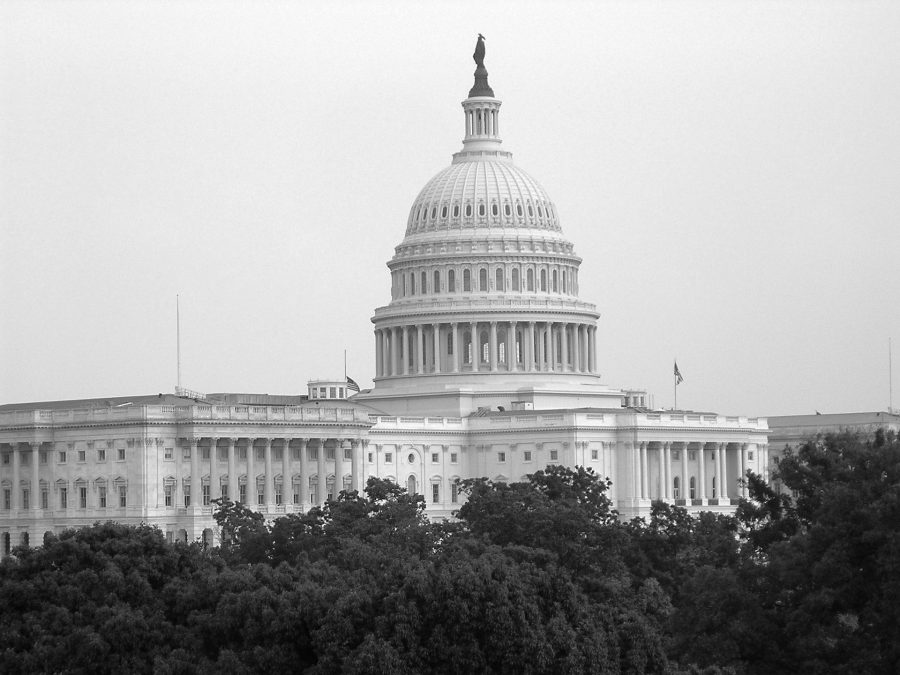President Trump’s schedule (EDT):
11:00 AM: Meets with national security officials at the Pentagon; and
12:30 p.m.: Has lunch with Secretary of State Pompeo. White House
“‘Carried Interest’ Back in Play as Democrats Eye Tax Offsets.” Yesterday’s CQ Roll Call article led with:
Democratic tax-writers are resurrecting one of their favorite targets as they hunt for revenue to pay for a new tax bill likely to renew dozens of breaks that expired at the beginning of last year, among other initiatives that could be rolled in.
Rep. Bill Pascrell Jr., D-N.J., a Ways and Means member, introduced legislation (HR 1735, press release) on Wednesday that would eliminate the preferential tax treatment of investment fund managers’ share of profits on their clients’ capital gains, known as “carried interest.” In December, the Congressional Budget Office said the proposal could raise $14 billion in revenue over a decade, though the agency said the forecast could fluctuate with economic conditions.
The House could easily pass this, but I doubt the Senate would, and the chances of enactment are low.
Tax “Filing Season Statistics for Week Ending March 8, 2019” nearly identical with last year’s. Yesterday’s release showed $160.874 b. of tax refunds paid so far, down 3.2% from last year’s $166.184 b. That’s in line with 3.3% fewer returns with refunds processed. That average refund of $3,008 was nearly identical with last year’s $3,004.
“Disaster Aid Vote Expected After Recess; Contents Uncertain.” Yesterday afternoon’s CQ Roll Call article led with:
Senate leaders are teeing up a vote after the weeklong St. Patrick’s Day recess on an as-yet-undefined disaster aid package for victims of major storms and other natural disasters during the last two years.
Senate Majority Leader Mitch McConnell, R-Ky., on Thursday filed a motion to limit debate on proceeding to a $14.2 billion disaster aid bill (HR 268) the House passed in January. Sen. David Perdue, R-Ga., sponsor of a competing $13.6 billion version (S 572), said the initial vote to proceed would likely occur on March 26. But the exact contents of the measure the Senate will take up will be unveiled as a substitute amendment that was still being negotiated by appropriators in both chambers.
The Perdue bill is similar in many respects to the House legislation as well as a $12.8 billion package Senate Republicans introduced in January. The House bill contains a little more agricultural assistance than either of the Senate versions, while the House bill and the Perdue bill would also provide $600 million in aid to Puerto Rico to restore nutrition benefits that were cut in early March when funding from the last aid package ran out.
Senate Appropriations Chairman Richard C. Shelby, R-Ala., said the ultimate version could be more expansive than the earlier iterations, in part because of the recent deadly tornadoes that ripped through parts of his home state and Georgia. And Democrats on Wednesday were still pressing for additional provisions to cover damages from the 2017 hurricanes, including Maria, which devastated Puerto Rico.
Disaster relief will be another unpaid for deficit increase.
“AFL-CIO Warns Administration on NAFTA Vote.” Yesterday afternoon’s CQ Roll Call article led with:
The AFL-CIO’s executive council warned Thursday that the labor union will launch a campaign to defeat the proposed trade agreement to replace NAFTA if the Trump administration asks Congress to vote on the pact before Mexico strengthens its labor laws.
The council in a statement said, “If the Administration insists on a premature vote on the new NAFTA in its current form, we will have no choice but to oppose it.”
The group’s threat comes amid efforts by U.S. Trade Representatives Robert Lighthizer to get Democrats behind the United States-Mexico-Canada Agreement, which would would replace the North America Free Trade Agreement.
Several House Democrats in meetings this week with Lighthizer raised similar concerns about holding a congressional vote on the proposed agreement before Mexico changes its labor laws. They suggested the Trump administration wait until Mexico acts.
“The Effect of Government Debt on Interest Rates.” Yesterday’s 31-page Congressional Budget Office working paper stated:
Under current law, the level of federal debt relative to gross domestic product (GDP) is projected to rise significantly over the next decade. The relationship between debt and interest rates plays a key role in the Congressional Budget Office’s economic and budget projections (especially long- term projections) and for dynamic analyses of fiscal policy, where the sensitivity of interest rates with respect to changes in the level of debt is vitally important. In this analysis, we use a reduced-form regression to estimate the relationship between projected federal debt and expected long-term interest rates. Our results suggest that the average long-run effect of debt on interest rates ranges from about 2 to 3 basis points for each increase of 1 percentage point in debt as a percentage of GDP. We also use a dynamic stochastic general equilibrium model to illustrate how the response of interest rates to debt depends on the type of fiscal policy generating changes in the debt. In the context of that model, fiscal policies that bolster incentives for households and firms to invest in private capital or supply additional labor elicit a smaller interest rate response than the response suggested by the reduced-form estimates, which do not control for the nature of the fiscal policy change. Conversely, the results suggest that a fiscal policy that contains few or no incentives for households and firms to invest in additional private capital or supply additional labor elicits a larger interest rate response than that suggested by the reduced-form estimates.







